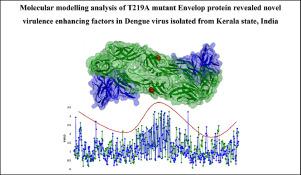Computer Methods and Programs in Biomedicine ( IF 4.9 ) Pub Date : 2020-05-24 , DOI: 10.1016/j.cmpb.2020.105481 Y Nanda Kumar 1 , G Jeyakodi 2 , N Pradeep Kumar 2 , K Gunasekaran 2 , P Jambulingam 2

|
Dengue virus (DENV) is an emerging health threat and its envelope glycoprotein E, is involved in the anchoring and fusion mechanisms. Anchoring followed by conformational changes of E-protein are responsible for the fusion and entry of DENV into host. The variation in the conformation of the E-protein due to mutations, results in its altered binding with antibodies (Abs) and also its receptors. This leads to failure of neutralization of DENV and enhance the infection. In our earlier studies we have identified T219A mutation in the E-protein of DENV and the present study is focused on the impact of this mutation on the conformation of E-protein and also its binding variation with Abs and Fc-γ receptor. A comparative molecular modelling studies of wild type and T219A mutant E-proteins revealed that, the mutation induced several conformational variations in the E-protein and resulted in the variable binding orientation with altered affinities. Further, the mutation was also observed to enhance the fusion mechanism by Fc-γ receptors that mediate the efficient entry of DENV into host cell through altered membrane fusion mechanism. Such conformational variations of E-protein could be the responsible factors for enhanced virulence of DENV infections.
中文翻译:

T219A突变型包膜蛋白的分子模型分析揭示了印度喀拉拉邦分离出的登革热病毒中新的毒力增强因子。
登革热病毒(DENV)是一种新兴的健康威胁,其包膜糖蛋白E参与锚定和融合机制。锚定随后是E蛋白的构象变化是DENV融合和进入宿主的原因。由于突变,E蛋白构象的变化导致其与抗体(Abs)以及其受体的结合改变。这导致DENV的中和失败并增强感染。在我们较早的研究中,我们已经在DENV的E蛋白中鉴定出T219A突变,而本研究的重点是该突变对E蛋白构象的影响及其与Abs和Fc-γ受体的结合变异。对野生型和T219A突变E蛋白进行的比较分子建模研究表明,这种突变诱导了E蛋白的几种构象变异,并导致亲和力改变的结合方向可变。此外,还观察到该突变通过Fc-γ受体增强了融合机制,所述Fc-γ受体通过改变的膜融合机制介导DENV有效进入宿主细胞。E蛋白的这种构象变异可能是DENV感染毒力增强的原因。











































 京公网安备 11010802027423号
京公网安备 11010802027423号